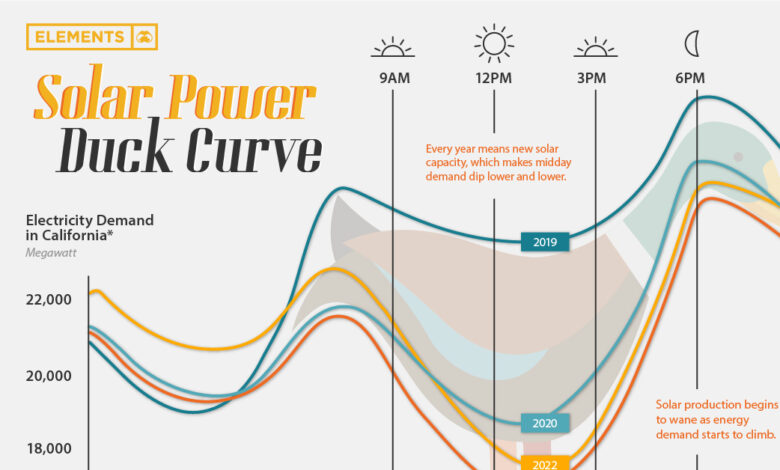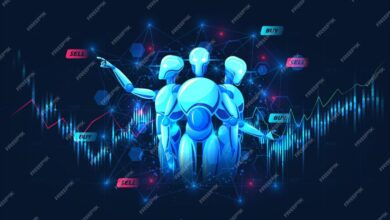
Is Artificial Intelligence Making Big Tech Too Big?
Is artificial intelligence making big tech too big? That’s the million-dollar question, and honestly, the answer is complex. We’re seeing a rapid consolidation of power in the tech world, fueled by AI’s incredible potential. The giants are gobbling up smaller companies, developing cutting-edge technologies, and leveraging massive datasets in ways that leave smaller players struggling to compete.
This isn’t just about market share; it’s about the potential for monopolies, stifled innovation, and significant ethical concerns.
This blog post dives into the heart of this debate, exploring how AI is reshaping the competitive landscape, the ethical implications of this concentrated power, and what the future might hold. We’ll examine the impact on competition, innovation, privacy, and economic inequality, and discuss potential regulatory solutions to address this burgeoning issue. Get ready to question everything you thought you knew about the future of tech!
Ethical Concerns and Regulatory Challenges
The concentration of artificial intelligence (AI) power within a few large tech companies presents a complex web of ethical dilemmas and regulatory challenges. The potential for misuse, bias, and lack of transparency demands careful consideration and proactive measures to ensure responsible AI development and deployment. This power imbalance raises concerns about fairness, accountability, and the very future of competition and innovation.The unprecedented capabilities of AI systems necessitate a new framework for ethical considerations and regulatory oversight.
Existing legal and regulatory structures often struggle to keep pace with the rapid advancements in AI, leaving significant gaps in addressing the unique challenges posed by this technology. This includes the need for clear guidelines on data privacy, algorithmic transparency, and liability in cases of AI-related harm.
Ethical Dilemmas Arising from AI Concentration
The concentration of AI power in the hands of a few big tech companies raises several significant ethical dilemmas. One key concern is the potential for biased algorithms. AI systems are trained on vast datasets, and if these datasets reflect existing societal biases, the resulting AI systems will likely perpetuate and even amplify these biases. This can lead to unfair or discriminatory outcomes in areas such as loan applications, hiring processes, and even criminal justice.
For example, facial recognition technology has been shown to be less accurate in identifying individuals with darker skin tones, leading to concerns about racial profiling and misidentification. Another significant ethical concern is the lack of transparency in how many AI systems operate. The complexity of these algorithms often makes it difficult to understand how they arrive at their decisions, making it challenging to identify and correct biases or errors.
This “black box” nature of AI raises concerns about accountability and the potential for misuse. Furthermore, the concentration of AI power can stifle innovation by creating barriers to entry for smaller companies and startups that lack the resources to compete with the dominant players.
Challenges for AI Regulators
Regulators face significant challenges in overseeing AI development and deployment. The rapid pace of technological advancement makes it difficult for regulatory frameworks to keep up. AI technologies are constantly evolving, making it challenging to create regulations that are both effective and adaptable. Another challenge is the global nature of AI development and deployment. AI systems are often developed and used across multiple jurisdictions, making it difficult to establish consistent regulatory standards.
Furthermore, the technical complexity of AI makes it difficult for regulators to effectively assess the risks and potential harms associated with these systems. Regulators often lack the technical expertise to fully understand the intricacies of AI algorithms and their potential impacts. Finally, there is a need to balance the need for regulation with the need to foster innovation.
Overly restrictive regulations could stifle the development of beneficial AI technologies, while insufficient regulation could lead to significant harms.
Comparison of AI Regulations Across Countries
Several countries are developing and implementing regulations related to AI. The European Union’s proposed AI Act aims to classify AI systems based on their risk level and establish different regulatory requirements accordingly. This approach focuses on risk mitigation and transparency, particularly for high-risk AI systems used in critical infrastructure or law enforcement. In contrast, the United States currently lacks a comprehensive federal AI law, with regulation largely occurring at the state level and through sector-specific regulations.
China has adopted a more proactive approach, focusing on promoting the development and application of AI while also establishing guidelines to address ethical concerns and ensure social stability. These approaches vary significantly, reflecting differing priorities and approaches to AI governance. There’s no single global standard yet, leading to a fragmented regulatory landscape.
How AI Algorithms Can Unfairly Advantage Big Tech
AI algorithms can be used to unfairly advantage big tech companies in several ways. First, access to vast amounts of data gives these companies a significant advantage in training and developing AI systems. This data advantage allows them to create more accurate and effective AI models, further strengthening their market position. Second, big tech companies often employ sophisticated AI systems to personalize user experiences and target advertising.
This allows them to better understand and influence consumer behavior, creating network effects that make it difficult for smaller companies to compete. Third, these companies can use AI to optimize their internal operations, improving efficiency and reducing costs. This allows them to offer lower prices or higher quality services, making it harder for competitors to keep up. These advantages, fueled by the power of AI, contribute to the concentration of power in the tech industry and create a self-reinforcing cycle of dominance.
The Future of AI and Big Tech: Is Artificial Intelligence Making Big Tech Too Big
The future of artificial intelligence and its relationship with Big Tech companies is a complex and rapidly evolving landscape. Several scenarios are possible, each with profound implications for the global economy, societal structures, and individual lives. The current dominance of a few powerful tech giants could be solidified, challenged, or even fundamentally reshaped by the trajectory of AI development.Predicting the future is inherently uncertain, but by examining current trends and potential technological breakthroughs, we can Artikel plausible scenarios and the factors that will shape them.
This includes the role of technological advancements, government regulation, and societal shifts in determining the ultimate impact of AI on the power dynamics within the tech industry.
Potential Scenarios for AI Development and its Impact
Several distinct futures are conceivable. In one scenario, the current Big Tech giants continue their dominance, leveraging AI to enhance their existing platforms and services, creating even greater network effects and solidifying their monopolies. This scenario sees AI becoming an integral tool for personalized advertising, data collection, and algorithmic control, potentially leading to increased concerns about privacy and censorship.
In contrast, a more decentralized future could emerge, with the development of open-source AI models and a proliferation of smaller, more specialized AI companies. This could foster greater competition and innovation but also pose challenges in terms of regulation and ensuring ethical AI development. A third possibility involves a significant shift in power, perhaps driven by the emergence of entirely new business models or technological breakthroughs that disrupt the current tech landscape.
This could involve the rise of entirely new AI-powered industries, potentially leading to the decline of some current Big Tech giants.
Technological Advancements Altering Power Dynamics
Several technological advancements could significantly alter the current power dynamics. For example, the development of truly general-purpose AI (AGI) – an AI with human-level intelligence – could fundamentally reshape the tech industry. Such an advancement could render many current tech platforms obsolete and create entirely new industries and business models. Similarly, breakthroughs in quantum computing could dramatically accelerate AI development, potentially widening the gap between leading tech companies and their competitors.
The development and widespread adoption of advanced robotics powered by AI could also lead to significant shifts in manufacturing, logistics, and other industries, potentially impacting the power and influence of current tech giants. Consider the impact of a fully autonomous vehicle system; this could dramatically reshape the automotive industry and related tech sectors, potentially challenging the existing power structures.
Government Intervention and Societal Changes
Government intervention and societal changes will play a critical role in shaping the future of AI and Big Tech. Stringent regulations on data privacy, algorithmic transparency, and antitrust could curb the power of Big Tech companies and promote a more competitive landscape. Conversely, a lack of effective regulation could allow Big Tech to consolidate its power even further.
Societal changes, such as increased public awareness of AI’s ethical implications and a growing demand for data privacy, could also influence the trajectory of AI development. For instance, a strong public backlash against biased AI algorithms could force companies to prioritize fairness and accountability in their AI systems. Increased public pressure for greater transparency and control over personal data could significantly impact data-driven business models.
Visual Representation of Future Scenarios, Is artificial intelligence making big tech too big
Imagine three distinct diagrams representing these future scenarios. Scenario 1: A large, centralized network representing Big Tech, with numerous smaller entities orbiting it, signifying their diminished influence. Thick lines connect the central network to the smaller entities, representing the control Big Tech exerts over data and resources. Scenario 2: A more decentralized network with many equally sized nodes, representing a more competitive and diverse landscape of AI companies.
Connections between nodes are thinner and more numerous, illustrating a more collaborative and less centralized structure. Scenario 3: A completely different landscape, with some nodes from the previous scenarios significantly reduced in size or absent, and new, large nodes representing entirely new AI-driven industries emerging as dominant forces. The connections between these nodes would represent the new power dynamics and relationships within this reshaped tech ecosystem.
The size of each node visually represents the relative power and influence of each entity within the AI ecosystem.
The relationship between artificial intelligence and the dominance of big tech is undeniably intricate and fraught with potential pitfalls. While AI offers incredible advancements, its concentration in the hands of a few powerful companies raises serious concerns about competition, innovation, privacy, and economic fairness. The path forward requires a careful balance: fostering innovation while actively mitigating the risks of unchecked corporate power.
We need robust regulations, proactive ethical considerations, and a collective societal effort to ensure AI benefits everyone, not just a select few. The future of technology hinges on it.
Is artificial intelligence fueling the growth of Big Tech, creating monopolies that stifle innovation? I’ve been thinking a lot about power imbalances lately, and it made me consider this article: alfredo ortiz in the trump economy small businesses are thriving so why are dems working to undermine it , which highlights how economic policies can impact small businesses.
The parallels are interesting; both situations involve concentrated power and the potential for unfair competition, ultimately questioning who truly benefits from technological advancement.
The unchecked growth of AI definitely raises concerns about big tech’s power – are we creating monopolies that stifle innovation and accountability? It’s a chilling thought, especially when you consider the abuse of power elsewhere; the news about the beating of Argentina’s former first lady fits a shameful pattern highlights how unchecked power, regardless of the source, can lead to horrific consequences.
This makes the question of big tech’s unchecked AI power even more urgent.
Is artificial intelligence making big tech too powerful? It’s a question worth pondering, especially when you consider how concentrated power can be used. Think about the massive resources involved – it’s almost like a wartime economy, similar to what’s happening in Russia, as detailed in this insightful article on how wartime spending is helping the Russian economy.
The parallels are striking; both scenarios involve massive infusions of capital into specific sectors, potentially leading to further consolidation of power and control, raising similar concerns about unchecked growth. So, are we creating another type of behemoth with AI?




